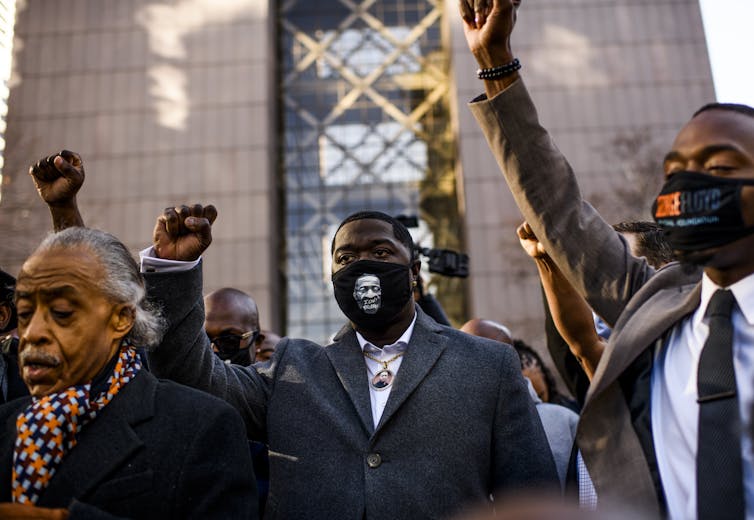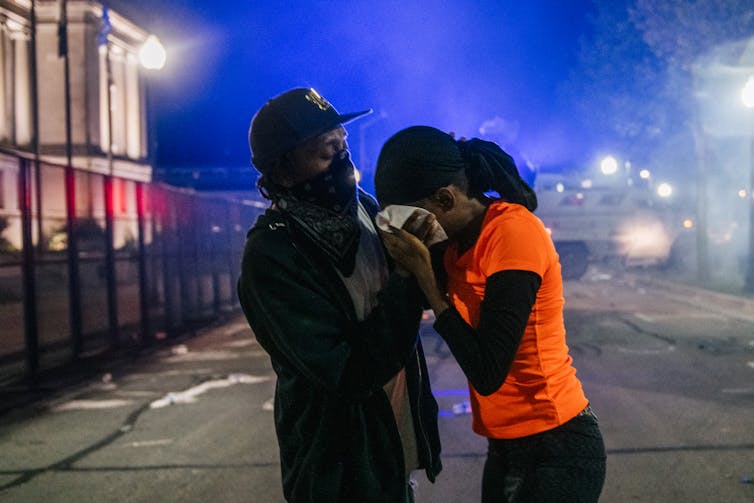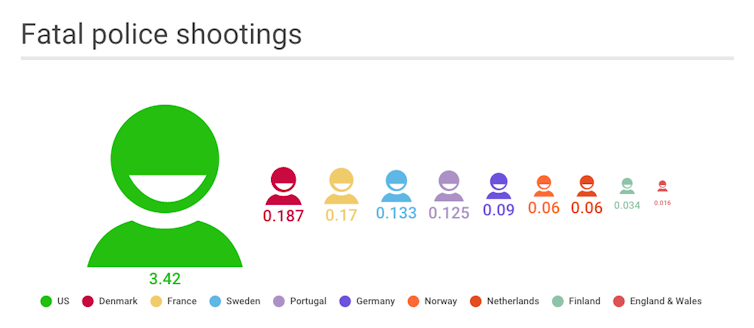
Experts in autocracies have pointed out that it is, unfortunately, easy to slip into normalizing the tyrant, hence it is important to hang on to outrage. These incidents which seem to call for the efforts of the Greek Furies (Erinyes) to come and deal with them will, I hope, help with that. As a reminder, though no one really knows how many there were supposed to be, the three names we have are Alecto, Megaera, and Tisiphone. These roughly translate as “unceasing,” “grudging,” and “vengeful destruction.”
As depressing as the topic of this article is, it is (or they are – five aspects are discussed) something we all need to be aware of and as nuch as possible able to present facts on. I don’t suppose we will ever actually reach the hearts of those who believe that people of color are, on account of their skin color, somehow “lesser,” much less those who on some level know that people of color are in no way “lesser” but who are so afraid of them they have trained themselves to be liev the myth. Not their hearts. Butit might be possible to get through to their minds or their consciences. Maybe. We have to try.
================================================================
Derek Chauvin trial begins in George Floyd murder case: 5 essential reads on police violence against Black men

Stephen Maturen/Getty Images
Catesby Holmes, The Conversation
The trial of former police officer Derek Chauvin for the murder of George Floyd is underway in Minneapolis, Minnesota.
Chauvin, who is white, is charged with second-degree murder, third-degree murder and manslaughter in connection with the death of George Floyd, who was Black, during an arrest last May. For 8 minutes and 46 seconds, Floyd – handcuffed and face down on the pavement – said repeatedly that he could not breathe, while other officers looked on.
A video of Floyd’s agonizing death soon went viral, triggering last summer’s unprecedented wave of mass protests against police violence and racism. Chauvin’s murder trial is expected to last up to four weeks.
These five stories offer expert analysis and key background on police violence, Derek Chauvin’s record and racism in U.S. law enforcement.
1. Police violence is a top cause of death for Black men
Since 2000, U.S. police have killed between 1,000 and 1,200 people per year, according to Fatal Encounters, an up-to-date archive of police killings. The victims are disproportionately likely to be Black, male and young, according to a study by Frank Edwards at the Rutgers School of Criminal Justice, in Newark.

Brandon Bell/Getty Images
In 2019, Edwards and two co-authors analyzed the Fatal Encounters data to assess how risk of death at the hands of police varies by age, sex and race or ethnicity. They found that while “police are responsible for a very small share of all deaths” in any given year, they “are responsible for a substantial proportion of all deaths of young people.”
Police violence was the sixth-leading cause of death for young men in the United States in 2019, after accidents, suicides, homicides, heart disease and cancer.
That risk is particularly high pronounced for young men of color, especially young Black men.
“About 1 in 1,000 Black men and boys are killed by police” during their lifetime, Edwards wrote.
In contrast, the general U.S. male population is killed by police at a rate of .52 per 1,000 – about half as often.
2. Chauvin has a track record of abuse
Many police officers who kill civilians have a history of violence or misconduct, including Chauvin.
In an article on police violence written after George Floyd’s killing, criminal justice scholar Jill McCorkel noted that Derek Chauvin was “the subject of at least 18 separate misconduct complaints and was involved in two additional shooting incidents.”
During a 2006 roadside stop, Chauvin was among six officers who fired 43 rounds into a truck driven by a man wanted for questioning in a domestic assault. The man, Wayne Reyes, who police said aimed a sawed-off shotgun at them, died. A Minnesota grand jury did not indict any of the officers.
Nationwide fewer than one in 12 complaints of police misconduct result in any kind of disciplinary action, according to McCorkel.
3. Bad police interactions hurt Black families
Even when officers who use excessive force are fired, as Chauvin was after the George Floyd killing, these incidents – occurring so frequently, for so many years – take an emotional toll on Black communities.
In a 2020 Gallup survey, one in four Black men ages 18 to 34 reported they had been treated unfairly by police within the last month.
The racism and inequality researchers Deadric T. Williams and Armon Perry analyzed data from the Fragile Families and Child Wellbeing Study, which surveyed nearly 5,000 families from U.S. cities, and found that negative police interactions have “far-reaching implications for Black families.”
“Fathers who reported experiencing a police stop were more likely to report conflict or lack of cooperation in their relationships with their children’s mother,” they wrote.
Black mothers also report “feelings of uncertainty and agitation” after Black fathers are stopped by police, Williams and Perry found. That can “affect the way that she views the relationship, leading to anger and frustration.”
4. This happens far less in Europe
According to a 2014 study on policing in Europe and the U.S. by Rutgers researcher Paul Hirschfield, American police were 18 times more lethal than Danish police and 100 times more lethal than Finnish police.

CC BY
The top reason for this difference, Hirschfield wrote in an article explaining his findings, is simple: guns.
In most U.S. states, it is “easy for adults to purchase handguns,” Hirschfield wrote, so “American police are primed to expect guns.” That may make them “more prone to misidentifying cellphones and screwdrivers as weapons.”
U.S. law is relatively forgiving of such mistakes. If officers can prove they had a “reasonable belief” that lives were in danger, they may be acquitted for killing unarmed civilians. In contrast, most European countries permit deadly force only when it is “absolutely necessary” to enforce the law.
“The unfounded fear of Darren Wilson – the former Ferguson cop who fatally shot Michael Brown – that Brown was armed would not have likely absolved him in Europe,” writes Hirschfield.
5. American policing has racist roots
Well before modern gun laws, racism ran deep in American policing, as criminal justice researcher Connie Hassett-Walker wrote in June 2020.
In the South, the first organized law enforcement was white slave patrols.
“The first slave patrols arose in South Carolina in the early 1700s,” Hassett-Walker wrote. By century’s end, every slave state had them. Slave patrols could legally enter anyone’s home based on suspicions that they were sheltering people who had escaped bondage.
Northern police forces did not originate in racial terror, but Hassett-Walker writes that they nonetheless inflicted it.
From New York City to Boston, early municipal police “were overwhelmingly white, male and more focused on responding to disorder than crime,” writes Hassett-Walker. “Officers were expected to control ‘dangerous classes’ that included African Americans, immigrants and the poor.”
This history persists today in the negative stereotypes of Black men as dangerous. That makes people like George Floyd more likely to be treated aggressively by police, with potentially lethal results.![]()
Catesby Holmes, International Editor | Politics Editor, The Conversation
This article is republished from The Conversation under a Creative Commons license. Read the original article.
================================================================
AMT, I have not been watching the actual trial, but have been following it through the videos of Glenn Kirschner. So far it is all pprosecution witnesses. Much has been heartbreaking – which is good, because what happened, what was done, was heartbreaking, so hearbreaking testimony is appropriate and necessary. Mr. Kirschner has expressed, and it certainly seems, that the prosecution is doing a good job – better than good. But of course juries are juries. It will be a while before we learn whether there will be justice.
The Furies and I will be back.
P.S. Thanks again to all who congratulated me on Post #250. This post is actually the one I’ve been waiting for. 260 weeks ix exactly five years. Time certainly does fly.
13 Responses to “Everyday Erinyes #260”
Sorry, the comment form is closed at this time.

Not one bit of surprise, in this well put together piece!
Well, maybe a bit of one, in regard to the roots of American policing. But, it is a sad thing that the issue itself is not surprising, given where we came from.
Thanks Joanne. Unlike so many other cases, the police officers who have testified found the restraint, length and degree of force problematic instead of testifying they found it appropriate.
The state has put on an amazingly solid prosecution. And Chauvin’s attorney (Nelson) has done an amazingly poor job, with a number of unforced errors on his part. Like when Nelson asked Darnella Frazier if the video she recorded (probably the one we’re most familiar with) changed her life.
I suppose Nelson thought she was going to allude to the notoriety she experienced. But instead she gave a heart-rending recitation about lying awake at night and apologizing to George Floyd over and over. Adding that she saw her own dad, brothers, cousins and uncles – and sees Floyd, because they are all black.
Nelson appears to have violated the cardinal legal rule: Never ask a question you don’t already know the answer to.
And when Police Dept. Lt. Zimmerman said Chauvin’s actions were “totally unnecessary” and “uncalled for” – I breathed a huge sigh of relief.
But it only takes one holdout for jury nullification and let Chauvin off the hook.
We can hope that Nelson is as stupid at jury selection as he is at reading witnesses. It appears to be a definite possibility. Kirscher said his heart lifted when he saw all the jurors reach for their notepads and start taking noted when Zimmerman started talking – that is a good sign.
It’s certainly true that police in this country have racist roots. The police in Minneapolis have racist roots. Having grown up in Minneapolis I have seen it first hand. It was no secret among the people of Minneapolis that our police were racist. It’s a fact everyone knew about and no one did anything about. Having grown up in Minneapolis, I have always believed that the people of our city and our State are racist. It’s no surprise that we have had racial riots throughout our State’s history. The stories of how the city police used to take blacks down to the Mississippi river and beat them up are legendary and true. This racist atmosphere within the police allowed this cop to think he could get away with this and no one would care, because for decades no one did care. Maybe a guilty verdict will bring real change to our police. We will see.
Hi, Jerry – thanks so much for your remarks from an actual Minnesotan. Yes, we have a hope (though no guarantee) for real change after a guilty verdict – if we get one. (I say “we” because I consider myself part of the community of Americans who deserve justice.)
Chauvin is evil….his actions were evil….in the end the question is “Would George Floyd have survived the day without Chauvin’s knee in his neck for 9 minutes?” and the answer is most certainly yes….
Congrats on 260 Erinyes in exactly five years, Joanne. A truly remarkable feat given the dark subject (obviously no pun intended) of most of the articles. I never know if I should thank you or ‘curse’ you for having me deal with such depressing subjects each week. But I will always thank you because I know and acknowledge your own pain and depression while researching and writing these articles which you feel obliged to put out there.
Your 260th article is another one of those which must have been hard to put together, my friend, because the causes behind Floyd’s death, and those of hundreds of other (young) black men, are manifold, complex and deeply embedded in American culture. In other words, not easy to resolve. Thank you for putting yourself through it and sharing it with us, Joanne.
Thank you, my dear. Yes. We can’t fix what we don’t know is broken, so we have to learn somehow. You are most gracious to keep subjecting yourself to news about what is not really your problem (thoug you may have analogous ones there.)
JD, this piece could not be more spot-on. I watched several hours of the trial and what I saw had me reaching for my Alka-Seltzer almost as much as I reached for my Kleenex!
Congrats and thanks for another interesting post, JD. The witnesses have been so compelling, real, heart-felt,etc. As someone else said, “integrity, humanity,decency were on display—-but not by Chauvin and the other 3 cops. We had an incident in Cols., OH in Dec. where cops shot, killed an unarmed black man w/his hands up, facing them,holding a phone. It was night and they were called only bc someone heard car starting repeatedly in neighbor’s garage. He was there HELPING a friend and giving her Xmas $$! Also in this case cops did not render aid to victim, let him die there while went into CYA mode. On and on it goes. Some how we keep hope alive. Take care,all.
Thanks SpyKat. I don’t think anywhere is immune – even when citizens are mostly not racist, that doesn’t mean the police won’t be. Our case that really got me was in the Denver Metro area when they killed Elijah McClain – a young man who used to visit animal shelters to play his violin for the animals just out of the goodness of his heart. Over a year ago and still no justice.
Excellent post, Joanne.
Reading your complete article, plus watching the trail this week, definitely showing the evil racist side of Derek Chauvin.
It was hard for me to listen to them speak of the way Chauvin treated George Floyd. George wasn’t threating the officer in any manner what so ever. Yet this rotten cop, continued be so rough and cruel.
What bothers me even more was seeing none of the other officers doing anything to get Chauvin to ease up one single bit.
It was a senseless killing of a innocent man.
I honestly pray to God that Chauvin will be found guilty in all the counts and will be locked up for the rest of his life.
Plus that this trail teaches other officers a real lesson in how to treat others, no matter of their race.
Thanks again, Joanne